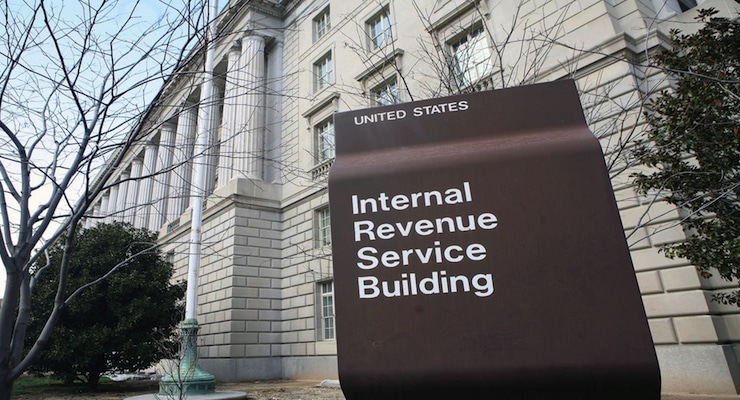

Internal Revenue Service (IRS) headquarters building in Washington D.C. (Photo: AP)s
Last year, I wrote a column for the Wall Street Journal making the case that families would benefit more from lower tax rates rather than targeted tax credits.
My argument was simple and straightforward.
Child-based tax cuts are an effective way of giving targeted relief to families with children… The more effective policy—at least in the long run—is to boost economic growth so that families have more income in the first place. Even very modest changes in annual growth, if sustained over time, can yield big increases in household income.
I then had a follow-up piece that expanded the discussion, responding to critics but also noting that advocates of lower rates and supporters of targeted credits at least agree on the importance of reducing double taxation and also want to address non-fiscal impediments to growth.
Now it’s time for a third installment in the series.
The Wall Street Journal opined today against tax credits, citing the challenges that have arisen on the other side of the ocean.
Parliament blocked David Cameron’s plan to reform family tax credits. There’s a warning here for conservatives…about the dangers of social engineering through taxation. At issue is a convoluted tax benefit developed by Tony Blair in 2003 that was supposed to reward low-income work and childbearing. …This policy hasn’t worked.
The editorial points out that welfare reforms deserve credit for a somewhat improved job market. Moreover, there’s scant evidence of desirable effects on birthrates (an important issue because of the collapsing welfare state, as I just discussed).
To the degree there are more births, it is because of the U.K.’s large immigrant population. Tax policy has no significant impact.
A 2013 Office for National Statistics study noted that the combination of economic climate and tax policy “does not have a clear impact in a particular direction.”
But there definitely is a measurable impact in other ways. People now expect to get checks from the government based on the size of their families.
…the tax credits have become a new entitlement for the child-rearing middle class. …eliminating the credits has proved to be politically difficult. The tax-credit system is so entrenched that it’s as hard to reform as any other entitlement… That’s a lesson for Americans as a debate about tax reform gathers momentum.
And the WSJ expands the lesson.
…the most pro-family tax policies are those that do the most to boost broad-based growth and raise incomes, which means a flatter tax code with lower rates and fewer distorting credits and exemptions. As Britain shows, the danger of using the tax code for pro-natalist social planning is that you end up with an expensive new entitlement that is merely another mechanism for income redistribution and can’t be reformed.
And if you want evidence, just look at how the so-called earned income tax credit has become the federal government’s fastest-growing entitlement program. So, why expand the problems of the EITC by creating new and bigger credits?
has become the federal government’s fastest-growing entitlement program. So, why expand the problems of the EITC by creating new and bigger credits?
Especially since the tax code already is a convoluted and corrupt mess. Writing for Investor’s Business Daily, Amity Shlaes and Gregory Thornbury make the case for a low-rate flat tax instead of expanded credits.
The fixation on family tax benefits abides, even though the tax code already features dozens of credits and deductions installed in the name of children. …The assumption that such credits are the best gift for the religious family dates back 100 child credits ago… But that doesn’t mean that the policy truly benefits families.
They explain that growth is more important. And you’re more likely to get a better-performing economy when marginal tax rates are reasonable.
…a better policy for families, then and today, is a tax code that does more to realize their aspirations than any political lobby. Such a plan has no child credits but would be simpler and flatter, with a top rate of, say, 20%, 18%, 15% or even, as Carson would have it, 10%. The reasons why this is so have to do with standard tax parameters such as marginal rates and standard tax concepts such as the incentive.
Keep in mind, by the way, that there are tradeoffs. If politicians want big credits, they will want to make up for the foregone revenue by raising tax burdens elsewhere.
Costly tax breaks like the child credit are one reason why top rates are so high in the first place. To compensate for the revenue that such a break forgoes, lawmakers raise rates at the top of the tax schedule or lower the point at which the top rate kicks in.
Last but not least, there’s a moral component to this debate.
There are taxes in the Bible. But nowhere does the Bible say that a great share of the rich man’s money has to go to a secular government. And it never crosses the minds of today’s politicians that they encourage their constituents to violate the 10th Commandment when they stoke resentment and envy. …Our code does feel like a maze because progressivity represents behavioral engineering par excellence. It treats humans like rats who struggle through, avoiding trap doors and hunting for chunks of cheddar cheese without ever gaining much idea of where they are. It’s time for a tax code that treats humans with dignity.
And that tax code, needless to say, is a simple and fair flat tax.
Which, for what it’s worth, includes a generous exemption based on family size. So the goal is to provide some tax relief to families, but to keep it reasonable so that other objectives (such as growth) can be realized.






